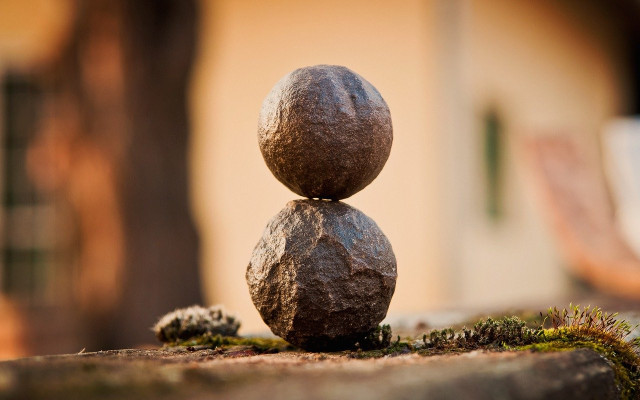The meaning of ikigai is a very individual one. The Japanese philosophy can help you find out what is truly important to you. Answering a few questions will help you find your ikigai!
Ikigai, The Japanese Philosophy of Life

We live in the digital age, and we spend so much of our time looking at screens. As a result, it can be hard not to lose yourself in this virtual world. There is a growing desire to re-focus on the here and now, on the self. This is where ikigai comes in.
The Japanese word ikigai, meaning a reason to live, is made up of the words ‘iki‘, ‘life’ and ‘gai‘, ‘use’ or ‘worth’. The core concept here is that each individual can find out what makes them feel like getting up each morning and beginning a new day. This personal motivation is the key to a long, fulfilled life.
Of course, Japanese culture is famous for its wisdom. The inhabitants of the island of Okinawa, in particular, are often considered to be among the happiest people on earth. Okinawans often live to be a hundred or more. So what is the meaning of ikigai – and how does it help – in practice?
The Meaning of Ikigai: Four Elements



According to the Japanese philosophy, every one of us has our own personal ikigai, meaning we can all find out what is truly important to us over the course of our lives.
It takes patience to find your ikigai. Although the personal questions on which ikigai is based may seem easy, it takes true reflection to find the right answers.
Ikigai is made up of four different fields or qualities. You can picture them as interconnected, overlapping circles: At the center, where all four circles overlap, is ikigai. The four elements are:
- Something you love doing.
- Something the world needs.
- Something you get paid for.
- Something you are good at.
At each of the points where two of these fields overlap, we find one of the basic requirements, or building blocks, of ikigai:
- Your mission: Something you love doing and something society needs.
- Your vocation: Something the world needs and you get paid for.
- Your profession: Something you get paid for and you’re good at.
- Your passion: Something you love and are good at.
Finding Your Ikigai



If you’d like to take the time to find out what ikigai means for you personally, start in a peaceful, comfortable place. Don’t rush when finding the four elements discussed above – really listen to yourself.
Consider each element one by one and write down any activities that seem applicable. You can then put your answers to the test with the following questions:
1. Something you love
- Does it inspire you?
- Can you do it for a long time, even all day, without getting tired of it?
- Do you like talking about it?
- Did you enjoy doing it even as a child?
2. Something the world needs
- Does it feel meaningful to you?
- Is it compatible with your values?
- Should it outlive you, or be remembered when you are gone?
- Would it be missed – and by whom – if you were to stop doing it?
3. Something you get paid for
- Is this your occupation?
- Do you earn a living doing this?
- Do you still have other sources of income?
4. Something you are good at
- Is this your talent?
- Are you better at this than others, or do others say you are good at this?
- Did you learn or study how to do this?
- Are there other, perhaps unusual, things you are good at?
What Comes Next?
Step by step, your own personal ikigai will take shape. Don’t worry if it takes time – you may want to repeat the process at different times and in different moods. Take note of key terms that keep coming up. Money itself only plays a secondary role in ikigai, meaning it’s more about you and your values.
Tip: You might find it hard at first to say what you love or enjoy doing. Don’t worry! There might be internal barriers or beliefs stopping you from just writing it down. But if the first thing you think of is lying in the sun reading a book all day, then write that down. Every answer is equally legitimate.
Also, the thing you love needn’t be something you’re great at already. If the mere thought of painting gives you joy, then painting is the right answer. It doesn’t matter how much talent or experience you have: You can always take a painting course!
What Else Does Ikigai Mean?



Alongside these key elements of your personal life, the ikigai philosophy has a few more elementary guidelines for a good life. Whatever our answers to the questions above, we can all try to apply the following rules to our everyday lives:
- Take time for dreams – and enjoy them!
- Try to keep active.
- Practice self-care.
- Be grateful, even for little things.
- Reduce stress as much as possible.
- Surround yourself with friends and people you like.
- Equally important: Spend time in nature.
- Stay curious!
If you would like to find out more about what your individual meaning of ikigai may be, we can recommend the following books:
- Ikigai: The Japanese Secret to a Long and Happy Life, by Héctor García and Franscesc Miralles. Available on Amazon.com**
- The Little Book of Ikigai, by Ken Mogi. Available on Amazon.com**
This text was translated from German to English by Will Tayler. You can read the original here: Ikigai: Mit der japanischen Philosophie den Sinn des Lebens finden
Important Information regarding Health-related Topics.
** Links to retailers marked with ** or underlined orange are partially partner links: If you buy here, you actively support Utopia.org, because we will receive a small part of the sales proceeds. More info.Do you like this post?






